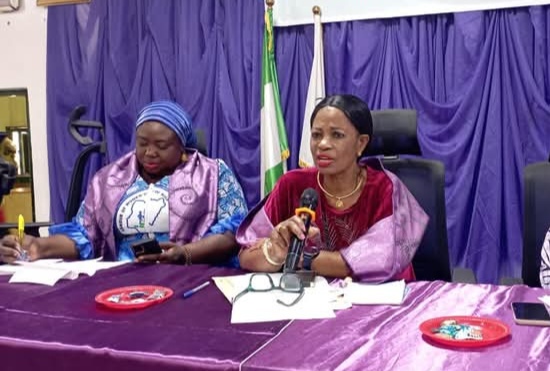By Shakirudeen Bankole
An association of Nigerian females in mining and associated business, the Women in Mining Nigeria (WIMIN) has recommended the economic liberalisation model as a way to transform the abundant mineral resources in the country into economic prosperity for the country and its people.
National President of WIMIN, Engr. (Mrs.) Janet F. Adeyemi, and Founder of the Royal School of Educational Therapy Foundation Dr. Badewa T. Adejugbe-Williams, expressed belief that the introduction of liberal reforms to Nigeria’s Mining Sector would bring about better value proposition to the entire value-chain system.
The two spoke at a recent webinar organised by WIMIN. They explained that ensuring equitable access to opportunities in the sector would help foster a culture of public accountability in the sector.
Adeyemi explained that a Liberal or Circular Economy involves the application of stringent measures that would generate value for each product and the entire value chain of mining.
Speaking on the topic: “Review of Best Practices and Case Studies Around the World,” Adeyemi said key principles under a liberalised economy include reduce, reuse, recycle, and regenerate of resources, stressing that the adoption of the model in Nigerian Mining sector would help resolve many environmental challenges occasioned by extractive activities.
According to her, “waste minimization involves reducing the amount of waste generated during mining operations, while resource efficiency ensures optimal use of extracted materials.”
Adeyemi listed ways to achieve this to include utilization of advanced technologies for precise extraction, reducing waste at the source; usage of automated sorting systems to separate valuable materials from waste rock; promotion of the reusage of by-products in other industries (e.g., construction); encouraging material substitution by finding alternative resources or synthetic options; and optimization of production processes to minimize energy and material input per unit output.
“Statistically,” she said, “an estimated global consumption of materials such as biomass, fossil fuels, metals and minerals is expected to double in the next forty years, with a projected annual waste generation increase by 70% by 2050.”
She stressed that around 50% of the world’s current greenhouse gas emissions result from the extraction and processing of natural resources, and the prediction is to double emissions by 2050, under a ‘business-as-usual’ scenario, theeby directly impacting the climate for upward trend of climate.
“Nigeria and many African countries need to borrow a cue from countries like Sweden, Canada, Australia, and even South Africa here, who leverage technology to turn their mining wastes into wealth,” she said.
Sweden, for example, through its Circular Mining Initiative, is exploiting technology, to repurpose mining by-products into fertilizers, with an impressive outcome of reduction of mining waste and creation of additional revenue streams.
Ditto for Australia, which through its Water Recycling Program, is doing similar thing with Sweden, by focusing on innovative water management systems for the urpose of reducing freshwater usage and achieving operational cost savings.
In South Africa and Canada, there are initiatives with focus on promoting small enterprises to recycle mining waste and the use of tailings in infrastructure projects, with a projected outcome of a sustainable disposal of tailings and economic benefits for nearby communities, respectively.
“Sweden’s mining industry uses advanced digital monitoring tools to optimize ore extraction, ” she said. “The country had also identified significant quantities of rare earth metals, which are essential for the production of electric vehicles and wind turbines. Currently, Europe lacks its own mining of rare earth metals, making the continent dependent on imports, mainly from China.
“Innovations are focused on safeguarding the physical structures used to impound materials, or re-mine waste to maximise value and reduce overall volume. There is no parallel and equivalent set of policy innovations focused on the interaction of mine waste with social systems, and the safeguarding affected people. This aspect of mining policy must move from the periphery of debates about mining and development to the center,” she concluded.
Adejugbe-Williams canvassed for a balanced numerical representation of both men and women in the Nigerian Mining Sector.
According to her, the current number of women in the mining sector in Nigeria is inadequate, adding that this is a clear manifestation of the institutional barriers, stereotypical biases and unhealthy toxicity prevalent in the sector.
She said while there are multiple opportunities for women in the sector – especially in the areas of training and education, networking and mentorship, government initiatives, and community engagement, there are also numerous challenges scaring women entrepreneurs. These include gender disparity, cultural barriers, health and safety concerns, economic problems, and work-life balance
She said: “According to statistics, women represent about 8% of the global mining workforce (figures vary by region). As of 2024, women comprise only 6.8% of the mining workforce in Nigeria. And out of this number, less than 15% of them hold leadership roles in mining companies.”
Adejugbe-Williams admonished women to take more risks, build important networks and pursue, with innovative mindset, their entrepreneurial careers, as opportunities are abound more in restricted economic landscapes.
“Women can lead change and create value in the mining industry. But the system must be enabled to allow for this,” she said.









